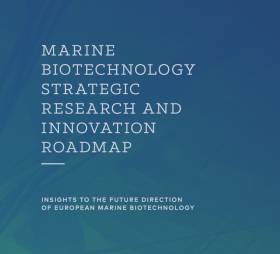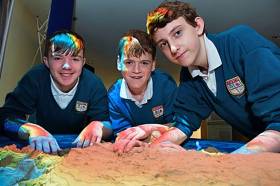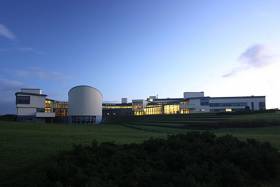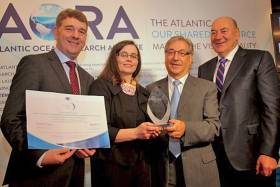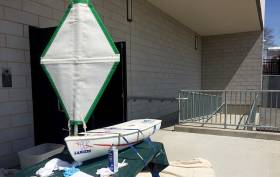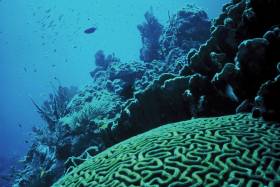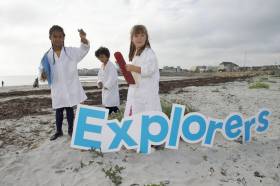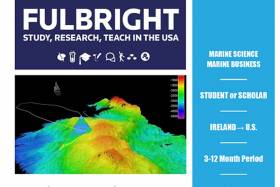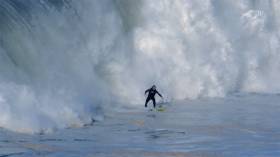Displaying items by tag: marine science
#MarineScience - As previously highlighted on Afloat.ie, the Marine Biotechnology Research and Innovation Roadmap was launched by the EU-funded Marine Biotechnology Consortium (ERA-MBT) last week in Brussels.
The consortium brings together 19 partners from 14 countries across Europe to work with stakeholders in identifying marine biotechnological needs, and gaps in the value chain in an attempt to increase the valorisation of marine bioresources.
Developing a roadmap for future research and innovation was a key project deliverable, and it will now set the direction for future marine biotechnology developments and transnational activities in Europe.
Ireland's Marine Institute is a partner in ERA-MBT and led the development of the Marine Biotechnology Strategic Research and Innovation Roadmap. Chief executive Dr Peter Heffernan congratulated all those involved in the development of the roadmap, in particular Dr Dermot Hurst, who led the Marine Institute's contribution.
"The role played by the Marine Institute in supporting the development of Ireland's marine biotechnology research capabilities through funds awarded to the NutraMara and Beaufort Biodiscovery projects has placed Ireland in a strong international position as a recognised leader in marine biotechnology and related research,” said Dr Heffernan.
Today's bioeconomy is advancing faster and showing greater promise than ever before, driven by both scientific advances and markets demanding sustainable solutions to todays global grand challenges of food and fuel security, sustainable industry and population health.
The global market for marine biotechnology has the potential to reach €5.8 billion by 2025, and Europe is recognised as a high-potential region for future growth resulting from an extensive, yet largely unexplored marine resource.
The Marine Biotechnology Strategic Research and Innovation Roadmap, which is available to download HERE, has been developed to support the development of marine biotechnology research and innovation, enabling its growth within a self-sustained enterprise driven network. The roadmap provides a practical and realistic approach by which marine bioresources and biotechnology can contribute to economic and societal progress.
National and European policy organisations can use the roadmap in developing measures to maximise the contribution of the oceans’ bioresources to the bioeconomy and societal welfare, and funding agencies can use it to identify marine biotechnology related research themes.
Speaking from Ireland's perspective, Dr Heffernan added: "This roadmap directs attention to areas of research which are relevant to Ireland's enterprise sector and as such confirms the opportunities described by the Harnessing Our Ocean Wealth Development Task Force regarding marine resource-based industries adding value to their products and services through marine biotechnology."
Marine Institute Open Day In November
#MarineScience - The Marine Institute is set to open its doors for its annual Open Day on Wednesday 23 November from 9.30am to 3pm.
The Open Day at Ireland's national agency for marine research, technology, development and innovation is especially aimed at second level students from Transition Year to the Leaving Cert cycle, their teachers and parents.
Visitors will have the opportunity to tour the state-of-the-art facilities on offer in Oranmore and to meet with researchers and scientists and hear about their careers in the marine.
They will also get to see some of the institute’s innovative work through a series of interactive exhibitions, including seabed mapping, research vessel operations and oceanography, as well as in fisheries and the marine environment.
There are three two-hour sessions available for student groups on the day: 9.30am to 11.30am, 11.15am to 1.15pm and 1pm to 3pm.
Places are limited, and will be allocated on a first come, first served basis. To book, contact Kathleen Sweeney at [email protected] before Friday 28 October.
Last year the Marine Institute hosted some 300 Transition Year students during Science Week as part of the Galway Science & Technology Festival, as previously reported on Afloat.ie.
Workshops For Ocean Mapping Software In Galway Next Month
#MarineScience - The Marine Institute will host a three-day workshop on some of the latest technology for ocean mapping next month when the CARIS World Tour stops off in Galway from Tuesday 15 to Thursday 17 November.
Information sessions, detailed demonstrations and hands-on software exercises will be the order of the week in an opportunity for the marine science community to learn about the next generation of CARIS software architecture and its benefits to the hydrographic industry.
Topics will include near real-time sonar data processing, variable resolution surfaces, IHO S-100 and related product specifications, as well as updates on the latest tools and features for efficient hydrographic information processing, management, production and discovery.
The CARIS World Tour will be relevant to surveyors, data processors, cartographers and GIS technicians, as well as managers and decision makers who want to understand the latest technology and trends in ocean mapping.
Participants can register to attend one, two, or all three days of workshops. Visit the CARS website to register and view the agenda HERE.
In related news, London’s School of Economic Science is hosting a marine data management and GIS workshop on Tuesday 22 November.
Under the theme ‘Is poor data management putting your operations at risk?’, the free workshop will examine how GIS technology and OceanWise products and services can deliver efficiencies. Register for this OceanWise event HERE.
Atlantic Ocean Research Alliance Project Wins International Award
#MarineScience - The Atlantic Ocean Research Alliance Co-ordination and Support Action (AORA-CSA) has received the first Atlantic Project Award for International Cooperation.
The Marine Institute-led project was presented with the accolade yesterday (Tuesday 27 September) during the Atlantic Stakeholders Conference at the Croke Park Conference Centre.
Karmenu Vella, European Commissioner for Environment, Maritime Affairs and Fisheries, presented the award to Dr Peter Heffernan and Dr Margaret Rae of the Marine Institute, the lead partner in the Horizon 2020-funded project to implement the Galway Statement on Atlantic Ocean co-operation and support the emerging blue economy.
Marine Minister Michael Creed highlighted the importance of the Atlantic Strategy to Ireland in his address to the conference, which aims to promote entrepreneurship and innovation as a hub for participants to make valuable contacts and explore areas for co-operation, share information and good practices, promote and identify new ideas as well as funding opportunities and partnerships for their projects.
"Just over half of the 400-plus delegates at the conference today are Irish, many of them SMEs, which shows the importance of the Atlantic Strategy to Ireland and the significant opportunities it represents,” said Dr Heffernan, the Marine Institute’s chief executive.
“Irish SMEs have the chance to meet face to face with potential research partners and investors, and to work together on ideas for novel marine projects at the networking and matchmaking activities here today.”
The Atlantic Strategy has influence on the European Union’s innovation and funding programmes, including the Horizon 2020 framework programme for research, the European Maritime and Fisheries Fund (EMFF) and the InterReg programme.
"Irish marine researchers have been very successful in winning blue growth research funding, with 5% of the available budget under Horizon 2020 in 2014 going to Irish researchers,” said Dr Heffernan. “Irish marine research projects benefitted from €5.6m funding and resulted in the creation of about 41 research jobs.
"Irish researchers had an equally strong performance in 2015, winning €2.86m in competitive funding, representing 4.7% of the total EU budget in this area."
Seven Irish research organisations were funded under the 2015 calls, with NUI Galway winning nearly €1m for a number of marine research projects.
Another notable Irish success was Brandon Bioscience Ltd, funded under the SME instrument as partners in the SEA MORE YIELD project to commercialise a novel biotech solution to yield losses in oil seed crops using native Irish seaweed.
The Atlantic Strategy Group, which oversees the implementation of the EU's Atlantic Strategy, is currently chaired by Ireland and made up of relevant member states (Ireland, UK, France, Portugal, and Spain), the European Parliament and the European Commission, as well as regional representatives.
Unmanned Mini Yacht Found In Connemara After Search Appeal
#Unmanned - Following our previous alert for an unmanned yacht off the Galway coast, the mini-yacht has been found after making landfall.
Kaitlyn Dow's self-built vessel Lancer was launched off the US coast four months ago as part of a high-school marine science project.
The now final-year student at Waterford High School in Connecticut tracked her sailboat by GPS across the Atlantic as it inched towards Galway Bay and Connemara.
It was finally recovered this past Saturday 17 September by eight-year-old Maedhbh Ní Ghionnáin on an island near her home in Lettermore, as The Day reports.
After her aunt received an email from Dow asking for any details of her boat's whereabouts, Maedhbh's family had been keeping a lookout before they found it on a beach virtually on their doorstep.
“In the middle of the day we went walking by the sea, and then we saw this white thing,” said Maedhbh, who also shared the story of her remarkable discovery with Raidió na Gaeltachta.
The news comes a month after another unmanned research sailboat was reported off the Kerry coast after nearly three years in the North Atlantic.
Registration Open For Stakeholder Meeting On Marine Biotech Roadmap
#MarineScience - The Marine Biotechnology ERA-NET will hold a stakeholder meeting, coinciding with the launch of the recently completed European Marine Biotechnology Research and Innovation Roadmap, on 12-14 October 2016 at the Hotel Marivaux in Brussels.
The stakeholder meeting builds on the key elements of the roadmap and will feature a wide range of speakers from international industry and the research community.
This event will run from 9am to 5pm on Thursday 13 October and from 9am to 1pm on Friday 14 October and comprises six sessions:
Session 1: Marine biotechnology, an industry perspective. With the aim of stimulating innovations based on the use of marine biotechnology to explore and maximise the use of marine bio-resources, speakers from different industry sectors will describe how they use a range of novel marine materials in commercial applications.
Session 2: Creating a marine biotechnology business. The challenges of building a business venture based on marine biotechnology are the focus of this session, which includes presentations on financing a new biotechnology enabled venture, managing knowledge transfer and intellectual property in addition to case studies presented by two marine biotechnology driven high-potential SMEs providing novel products to vastly different global markets.
Session 3: Supporting marine biotechnology RTDI. Leading industry practitioners will will give their perspectives on the future opportunities to develop new research tools and infrastructure; novel processes and applications in the health, food and food ingredients sectors.
Session 4: ERA-MBT and other EU supported marine biotechnology projects. Participants will learn of the impacts and outputs from some of Europe's major publicly funded marine biotechnology research projects and hear of the progress on projects funded by the first ERA-MBT call for research proposals.
Session 5 & 6: Future research opportunities and setting priorities. Highly interactive sessions will focus on mechanisms to support marine biotechnology and set priorities for marine biotechnology research and innovation.
The launch of the Marine Biotechnology Research and Innovation Roadmap will be held on Wednesday 12 October at 4pm followed by a networking cocktail at 6pm.
The roadmap highlights research and innovation as spanning scientific, technological, economic and societal challenges and sets a marine biotechnology research and innovation agenda to 2030.
It identifies five thematic areas; the first three enable exploration of the marine environment; support biomass production and processing; and contribute to product innovation and differentiation. Two other themes, policy support and stimulation; and the provision of enabling technologies and infrastructure; provide the foundation to support growth in the Blue Bioeconomy.
National and European policy organisations can use the roadmap in developing measures to maximise the contribution of the ocean's bio-resources to the bio-economy and societal welfare, and funding agencies can use it to identify marine biotechnology related research themes.
The stakeholder meeting and roadmap launch is open for all stakeholders and can be attended for free. The number of places is limited and will be allocated on the first come, firstserved basis. Participants are required to register before Monday 26 September.
For programme details, online registration and accommodation information, see the MarineBiotech website HERE.
Primary Schools' Marine Education Programme Expands
#MarineScience - The Marine Institute’s Explorers Education Programme is growing and is now available in Galway, Clare, Mayo, Cork and Waterford, delivered by centres including Galway Atlantaquaria, Loop Head Summer Hedge School, Redrose Developments, Lifetime Lab and Oceanic Surf School and the Marine Education Centre.
The centres will be introducing marine-based education modules to more than 3,000 primary school children during the next school year (2016-2017), promoting the importance of our ocean through saltwater aquariums in classrooms, seashore safaris, marine projects, marine workshops and special science and art projects.
Marine Institute chief executive Dr Peter Heffernan congratulated the centres on joining the Explorers Education Programme, highlighting that “their expertise and enthusiasm for our oceans provides an important platform for teaching marine themes in the classroom and helps to support and reconnect teachers and their students with the marine environment.
“As an Island nation with a seabed territory 10 times greater than the size of the island of Ireland, it is fundamental that we realise the value, opportunities and social benefits the ocean provides us.
"On a daily basis the ocean produces over half the oxygen we breath, provides us with food and supports the tiniest microscopic plants to the largest animals on earth. It is therefore essential that we learn about the influence the ocean has on us and the influence we have on the ocean."
As part of the development of the programme, Galway Atlantaquaria – Ireland's national aquarium – has been contracted to provide professional development training and workshops for teachers in schools as well as assist with workshops for trainee teachers at DCU-St Patrick’s, introducing marine themes into the curriculum.
“Recognising the unique position teachers have to inspire their students, the institute welcomes the opportunity to help teachers generate curiosity among their students to learn more about our ocean wealth as well as realize some of the amazing marine career opportunities,” said Cushla Dromgool-Regan, responsible for the strategic development of education at the Marine Institute.
Details of Explorers Education Programme modules and the centre contacts are available at www.explorers.ie. Booking to take part in the modules is essential and teachers should contact the relevant outreach centres listed on the site.
Centres selected to represent the Explorers Education Programme were chosen in line with the public sector procurement guidelines. The programme is supported by the Marine Institute and is funded under the Marine Research Programme by the Irish Government.
Applications Open To Marine Researchers For Fulbright-Marine Institute Award
#MarineScience - The Fulbright Commission and the Marine Institute are offering a unique opportunity for an Irish PhD candidate or scholar to travel to the US to research in the fields of marine science or marine-related business sector.
The commission is particularly interested in receiving applications for this award from candidates who are exploring:
- Marine Sensor Technologies and Observation Systems
- Maritime Economics
- Marine Spatial Planning, Maritime Law and Security
- Renewable Ocean Energy
- Marine Biotechnology (including Functional Foods)
- Marine Environment
- Oceanographic Modelling
- Shipping, Seafood Safety, and
- Ecosystems-based Fisheries Management
Fulbright Irish Awards offer funding and administrative support for Irish citizens and EU citizens (resident in Ireland for more than three years) to study, research or teach/lecture in the USA for a period of four months or one semester, up to one year.
The application period is now open with a deadline is 4pm on Friday 28 October.
Details of the 2017-2018 Fulbright-Marine Institute Award to conduct postgraduate research in the US in all fields of marine science or marine-related business sector are available at the Marine Institute website HERE.
Fulbright staff will hold a webinar giving general information on the Fulbright Irish Awards at 1pm next Tuesday 13 September – email [email protected] if you would like to register.
Fulbright award managers can be reached on 01 660 7670 or at [email protected] to answer application queries. Fulbright Ireland ambassadors are also available to give on-campus support.
Ocean Warming Poses Threat To Marine Wildlife & Food Chain
#OceanWarming - Warming oceans are not only throwing marine ecosystems into disarray, but are also encouraging the spread of water-borne bacteria and viruses around the world, a new study warns.
The Irish Examiner reports on new findings from the International Union for Conservation of Nature (IUCN), which says the world is "completely unprepared" for the consequences of ocean warming, which have already been seen as fish and marine mammal species move into cooler northern waters.
Coming in their wake, however, are tropical pathogens such as Vibrio vulnificus, related to the cholera bacteria, and potentially toxic algal blooms that could enter the food chain – comprising what scientists are calling the "greatest hidden challenge of our generation".
Rising sea temperatures are already wreaking havoc on corals off East Africa in the Indian Ocean, and affecting the breeding success of seabirds, ocean reptiles, jellyfish and plankton – the foodstuff of large baleen whales and basking sharks, which frequent Irish shores.
The Irish Examiner has more on the story HERE.
New Big Wave Hotspot Discovered Off Irish Coast
#Surfing - Chasing the most challenging swells is the dream of the world's top big wave surfers, who've made an art of determining where the tallest walls of water can be found.
But now one Irish coastal regular reveals how he turned to science for his discovery of a new secret hotspot off the North West.
As Mail Online reports, Andrew 'Cotty' Cotton consulted with weather analysts and oceanographers in poring over satellite data to find the offshore sweet spot – generating waves that averaged some nine metres, or 30 feet – after the stormy winter of late 2014.
However, the Devon surfer believes the location could produce swells more than twice that size – and may even break the record for the biggest wave ever surfed as set at Nazaré in Portugal by Garrett McNamara in 2013.
Cotty's quest is the subject of a new documentary on RedBull.tv, while Mail Online has much more on the story HERE.


























